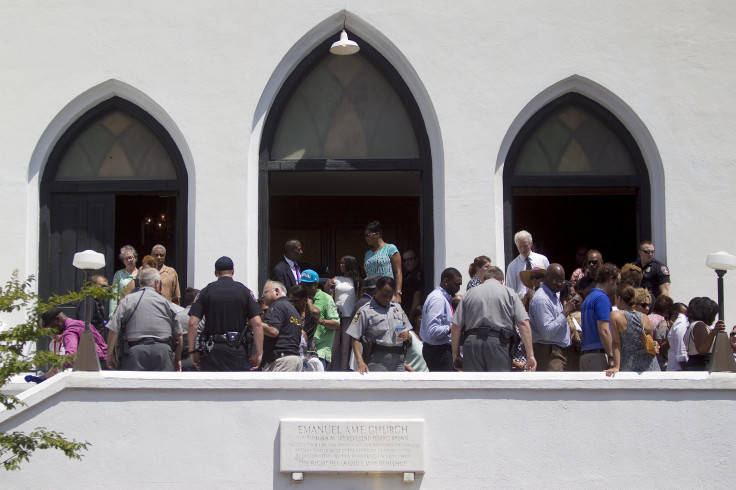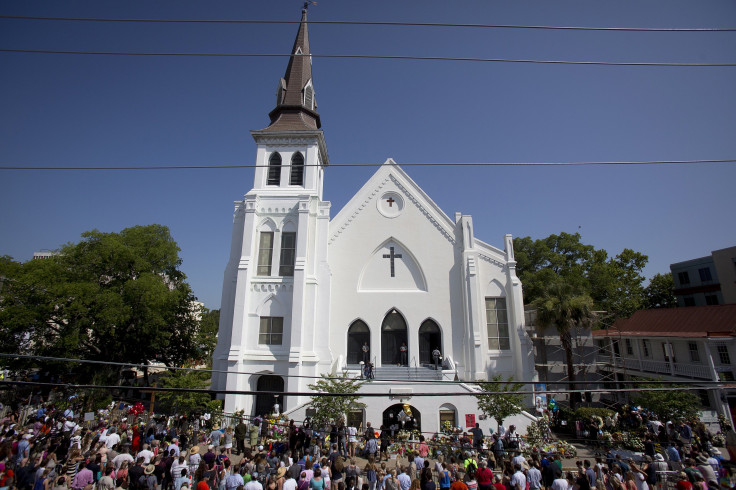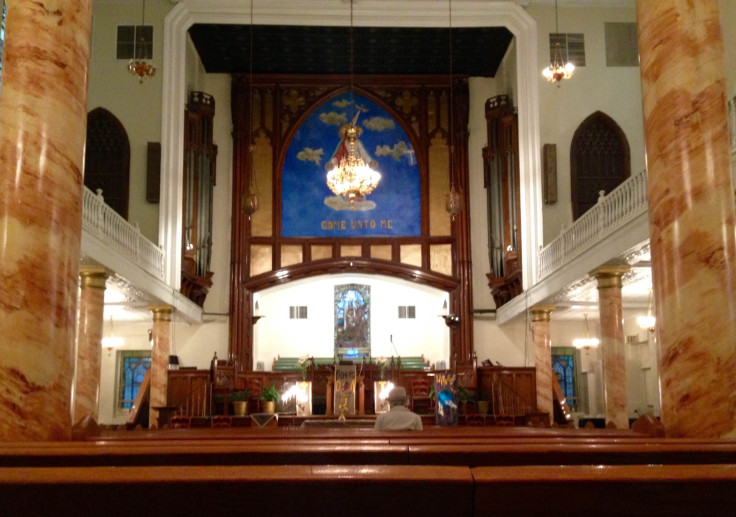Inside AME Church, Charleston Shooting Condemned As 'Racist Killing,' Used As A Call To Action In Sermons

NEW YORK -- Pearl Rogers was among the first to arrive for the early-morning worship service at the First African Methodist Episcopal Church: Bethel in Harlem Sunday. She didn’t make it to a vigil the church held last week in solidarity with a historic AME church in Charleston, South Carolina, where nine black members attending an evening Bible study session died in a massacre fueled by a white shooter’s hatred of blacks.
“I don’t go out at night,” said Rogers, a 25-year member of Bethel who is also a native of North Carolina. She closed an umbrella that shielded her white, wide-brimmed church hat from the morning rain and took a seat near the front of sanctuary, where a minister called the sparsely attended first service to order.
“The AME church is a good church,” Rogers said. “It’s awful what happened to those people.”
New York Mayor Bill de Blasio promised stepped-up police presence at churches around the city, in response to safety concerns over the shooting that caught national attention. Members said police had been stationed outside the church Thursday, but there were no officers seen before the Sunday morning service at Bethel.
“We should get all the protection we need,” Rogers said.
She and other attendees said they anticipated a sermonic response to the shooting at Emanuel AME Church in Charleston, on the first Sunday since 21-year-old Dylann Roof reportedly sat with the Bible study group before he opened fire. From the call to worship to the benediction, the themes of triumphing over evil and of emulating peace and forgiveness were used to remind members about the church’s roots in 19th century social-justice and slavery-abolition movements.
“Goliath is only temporary,” the congregation read in unison, at the open of the service. “Every Goliath will die ... the Goliath of slavery died in every Southern state ... Our God reigns over every Goliath!”
The church’s pastor, the Rev. Henry Allen Belin III, then stood at the pulpit to condemn the shooting and blast leaders in South Carolina and across the country who he said had failed to label the shooting a terrorist attack. “The racist killing of nine persons -- this intentional attack upon people who like us desired to worship -- was a treacherous, terroristic act that has rocked this pastor,” he said.
Belin called out a National Rifle Association board member for suggesting that the Emanuel church pastor and state Sen. Clementa Pinckney, who was slain in the mass shooting Wednesday, caused his own death by opposing gun-rights legislation. He singled out former Texas Gov. Rick Perry, a 2016 Republican U.S. presidential candidate, for calling the shooting an “accident.” (Perry’s campaign later clarified that he meant “incident.”)

Scores of churchgoers in Charleston Sunday heard similar messages at ground zero of the attack that made international headlines. People packed Emanuel church, sitting shoulder to shoulder, to hear ministers speak in Pinckney’s stead.
“We realize that in this life there’s ups and downs,” a minister told the congregants. “We realize that there are dark days, but there are so many bright days.”
Another minister said: “We are living testimony that God is still on his throne. I declare, if you keep your hands in God’s hands, that everything will be all right.“
In New York, Belin spoke of Emanuel’s founding. It was Morris Brown, a free black man and an adherent of the predominantly white Christian Methodist faith, who walked out of a church in Charleston in 1816 to establish a branch that honored the struggles of enslaved and free people of African descent, according to the AME Church website. Brown founded the church with Denmark Vesey, who led an unsuccessful slave rebellion in Charleston in 1822. The failure drove the church underground and led to Vesey’s persecution. Vesey was hanged, and the church was burned. The Emanuel AME Church did not emerge again until 1865.
“[Our] tradition ... is grounded in the urgent desire to emerge from the tyranny of injustice in any form or fashion,” Belin said. “There was a need for people of African descent to be able to come and worship in a place that they recognized. [They wanted] a place where they were not second-class citizens, where they were not three-fifths of a person [and] where they were not enslaved by birth.”

Sheila Major, a 58-year-old resident of Anderson, a South Carolina town southwest of Charleston, was in New York for the service at Bethel Sunday. While she agreed something needed to be done politically, she questioned the timing of responding to the shooting politically while people are still mourning.
“This has Satan written all over it,” Major said of the shooting. “God is all about love and caring. People are losing track of that by focusing on politics. Let God handle it. I’m not supposed to judge [the shooter.]”
The Rev. Millard Southern, who led the first part of Bethel’s morning service, said religion cannot be separated from politics when people are dying in this way. “You have to speak truth to power,” he said. “His message was timely. He has been very vocal about this in recent months.”
Diane Futrell, an African-American member of the Bethel church who has attended on and off for 30 years, said evil -- and racism -- can only be rooted out when people acknowledge it the way Belin did. “[Roof] didn’t just get these beliefs on his own,” Futrell said. “This has so much historical significance. People need to acknowledge it.”
Belin said he would travel to Charleston next week to help officiate at funeral services for the people killed in the shooting. He said activists and ministers should be ready to speak to the U.S. Congress about gun control and race relations when lawmakers return from their summer break.
“We’re going to be part of the solution, beloveds,” Belin said. “These deaths must not be in vain. They can try to take our lives, but they can’t change who we are.”
© Copyright IBTimes 2024. All rights reserved.






















